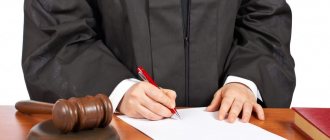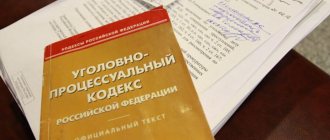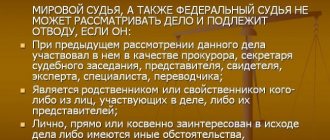Interpretation of the concept in legislation
This word comes from Latin. Unlike amnesty or pardon, it involves the full restoration of a person’s rights, since they were unlawfully infringed.
The right to rehabilitation is guaranteed by Art. 53 of the Constitution of the Russian Federation. It lies in the fact that the state is obliged to compensate for the harm caused to a citizen that he received as a result of unlawful actions of the authorities or officials.
Reference. Recognition of the right to rehabilitation is also entrusted to international legal acts, which also establish it as basic.
In the science of criminal law, it means the procedure for restoring the rights and freedoms of a citizen who has been illegally subjected to criminal prosecution, and therefore can count on compensation for damage from the state.
Composition of legal relations for rehabilitation (diagram)
The Code of Criminal Procedure of the Russian Federation contains an exhaustive list of persons who have the right to restore rights in the event of their violation by government agencies and employees. It is established in Part 2 of Article 133 of the Code.
The right to rehabilitation according to the Criminal Procedure Code can be exercised by:
- defendant;
- suspect/accused;
- convicted;
- a citizen against whom compulsory medical measures were applied;
- persons unlawfully subjected to procedural coercive measures.
Reasons for appearance
The main basis for rehabilitation is determined by a judicial or procedural decision that was made in violation of legislative norms or in violation of the rights of citizens.
This also includes the termination of an unlawful decision on the use of coercive measures of a medical nature.
They are listed in more detail in the corresponding article of the Code of Criminal Procedure of the Russian Federation, which we will examine in the next section.
Contents of Art. 133 Code of Criminal Procedure of the Russian Federation with comments
This is a fairly extensive article consisting of 5 parts. It interprets the grounds and conditions for the emergence of the right to rehabilitation. The first of them states that this right includes restoration of his pension and other rights.
In this case, the damage must be compensated in full, regardless of the specific fault of the police officers.
The second lists the categories of persons who have the right to count on rehabilitation:
- those in respect of whom a sentence has been passed, in which it is recognized that the citizen has been accused against the law, and he is obliged to return all his rights;
- possible criminal, according to paragraphs. 1, 2, 5, 6 hours 1 tbsp. 24 and paragraphs. 1, 4, 5, 6 hours 1 tbsp. 27 of this code;
- persons when canceling an unlawful court decision on the use of coercive measures medical. character;
- other persons who were persecuted outside the framework of the law.
Part 2.1 states that these rules also apply to persons participating in private criminal cases.
According to Part 3 of Art. 133 of the Code of Criminal Procedure of the Russian Federation, the grounds and procedural procedure for rehabilitation listed above apply to any citizen who has been subjected to coercion outside the framework of the legislation of the Russian Federation.
Part 4 lists cases that are not covered by Part 3 of this article:
- the conviction was canceled or changed as a result of the issuance of an amnesty act or the expiration of the statute of limitations;
- it was canceled because an adult citizen has a mental retardation and, accordingly, cannot realize the full illegality of his actions;
- when a bill was passed that abolished the criminality of a person’s act.
According to Part 5, other issues related to compensation for damage received are resolved in court.
Compensation for damage occurs at the expense of funds from the budget of the state, constituent entity of the Russian Federation or municipal entity. It must be carried out in full, and if the money was not paid on time, then they are subject to indexation under Art. 208 Code of Civil Procedure of the Russian Federation.
Important! There is only one condition for compensation for damages: they must be caused solely as a result of criminal prosecution.
This may also include situations where a police officer is forced to “resign of his own free will” if he is brought to criminal liability. After he has been rehabilitated in his rights, he is subject to reinstatement in his former position.
Defendants
These persons, including in the framework of private prosecution cases initiated by the inquiry officer with the permission of the prosecutor, investigator, head of the investigative unit, have the right to rehabilitation if an acquittal was made against him. Such an act is adopted in cases where the event of a crime has not been established, the non-involvement of a person in an act has been established, or in the absence of corpus delicti in the actions of the subject. According to Article 133 of the Code of Criminal Procedure of the Russian Federation, rehabilitation is also guaranteed for defendants who have been acquitted by a jury.
Restoration of rights is also carried out in the event of termination of prosecution due to the public prosecutor's refusal to charge. An official can exercise this right by virtue of the provisions of Part 7 of Article 246 of the Code of Criminal Procedure. Refusal of charges occurs if, during the proceedings, the state prosecutor comes to the conclusion that the evidence presented in court does not support the charges brought against the citizen. When refusing, the authorized person must give reasons for his or her convictions.
Procedure
In this section we will talk about the procedure for recognizing the right to rehabilitation.
If there are grounds to believe that a citizen was convicted illegally, then the court or prosecutor is obliged to take measures established by law to restore his rights.
To do this, the citizen is sent a copy of the decision and an explanation of how he can receive money for violating his rights.
The notice lists the following information:
- information about the authorities to which he is obliged to apply;
- time period of circulation;
- procedure for consideration;
- how the decision on payments and their amount is appealed.
Let's say a citizen died.
Then the rights to rehabilitation pass to his relatives or those heirs who are indicated in the relevant documents. As a rule, information about them is clarified during the investigation of the case or legal proceedings. They are sent the above papers and notice no later than 5 days from the moment they contact the authorities of inquiry or investigation.
Accused/suspects
These citizens, including in cases of private prosecution, are guaranteed rehabilitation under the Criminal Procedure Code if the prosecution is terminated due to the lack of:
- elements or events of a crime;
- statements from the victim, if the case can only be initiated if there is one;
- conclusions of the court on the presence of signs of illegal acts in the actions of the subjects listed in Article 448 (Part 1, clauses 1, 3, 4, 5, 9, 10);
- consent of the Federation Council, the State Duma, the judicial qualification board to initiate proceedings, involve in the status of an accused person endowed with immunity, deprivation of immunity of the President who has terminated his powers.
Accused/suspects may exercise the right to rehabilitation in the following cases:
- establishing their non-involvement in the crime;
- the presence of an unreversed verdict or ruling of the court, a resolution of the investigator, inquiry officer on the same charge to terminate the case or refuse to initiate it.
According to the Code of Criminal Procedure, rehabilitation for convicted persons is provided in the same cases as described above. In addition, it is guaranteed if:
- partial/complete cancellation of the indictment that came into force and termination of the case in connection with the establishment of non-involvement in the crime;
- expiration of deadlines;
- death of the convicted person, except in situations where proceedings continue to restore the rights of the deceased.
For persons to whom medical coercive measures have been applied, rehabilitation is provided for in the Code of Criminal Procedure in the event of the cancellation of the relevant decision due to proof of its groundlessness and illegality.
What is the procedure for restoring other rights of rehabilitated persons?
Compensation for property damage includes:
- salary, pensions and other benefits that the citizen was deprived of;
- confiscation of those properties that were converted into state income;
- the amount of fines and costs incurred by him as a result of legal proceedings;
- money paid by a citizen for using the services of a lawyer;
- other expenses.
You should contact the following courts:
- the court that passed the sentence;
- which is located at the citizen’s place of residence;
- the one where the ruling was made.
Within a month from the moment the claim is submitted to the court, the judge is obliged to determine the amount of payments and issue a ruling on compensation for damage. A copy is sent to the citizen himself.
If a citizen does not agree with the size and number of payments determined to him, then he can appeal the decision. How they should be carried out must also be decided in court.
Restoration of other rights of the rehabilitated person must also be made in accordance with the current legislation of the Russian Federation and no later than one month.
For example, if information about an incident with a citizen is included in the media, then they must also give a message within a month that he has been restored to all rights, and the charges against him have been completely dropped.
Within 2 weeks, the investigator or the court must send to the place of work/study or residence copies of documents confirming that he has fully regained his good name. Thus, he can expect to be accepted back to his job or to the institution where he studied.
If a citizen has been deprived of a military, honorary or other rank, he is required to restore it. The same applies to state awards.
It is worth noting that all the rules listed above also apply to companies and organizations whose rights have been violated. This means that their representatives must go to court in the same way, where they will make a decision on the amount and how payments will be made.
Partial compensation for damage
According to Article 133 of the Code of Criminal Procedure, rehabilitation does not exclude the possibility of compensating the subject for damage caused by unlawful actions of government agencies. Denial of compensation simply because a person has been found guilty of some other crime should be considered unreasonable.
As the Constitutional Court explains, in such cases, the courts, guided by the law, the principles of justice and the priority of freedoms and human rights, taking into account the specific circumstances of the case, can make a decision on compensation for harm to a subject acquitted in one case, but accused in another.
According to the norms of Chapter 18 of the Code of Criminal Procedure of the Russian Federation, rehabilitation can also take place when a citizen is acquitted of several crimes while simultaneously being recognized as involved in another act.
Rehabilitation in criminal proceedings: clarifications from the highest courts of Russia and the ECHR
Article 133 of the Code of Criminal Procedure of the Russian Federation establishes the concept of rehabilitation and the grounds for the emergence of the right to it. Rehabilitation means recognition by the state of the illegality or unfoundedness of the criminal prosecution of a person (definition of the Constitutional Court of the Russian Federation of November 20, 2008 No. 777-О-О) and compensation for the harm caused by such.
By virtue of Art. 138 of the Code of Criminal Procedure of the Russian Federation, all rights of the rehabilitated person that were violated as a result of illegal criminal prosecution are subject to restoration.
At the same time, if an incorrect classification of an act resulted in harm to the accused, he has the right to rehabilitation (Resolution of the Plenum of the Armed Forces of the Russian Federation dated November 29, 2011 No. 17). This situation arises, for example, when a preventive measure in the form of detention was applied to the accused, and as a result of reclassification he is charged with committing a crime for which punishment in the form of imprisonment for a term of more than three years is not provided, and therefore such the preventive measure could not be applied to him. The problem of applying the norms of the criminal procedure law on the restoration of the rights of a rehabilitated person still remains relevant both for the scientific community and for practitioners. Despite the often heard words about the small number of acquittals, the logic of the Supreme Court of the Russian Federation, which has repeatedly spoken about the need to evaluate this number taking into account sentences passed in a special order, terminated at the stage of investigation and by the court of criminal cases, seems more adequate to the realities. For these requirements, alternative jurisdiction is provided at the choice of the rehabilitated: they can be submitted either to the court that passed the sentence or issued a resolution, a ruling on the termination of the criminal case, or to the court at the location of the body that issued the decision to terminate the criminal case, or to the court according to place of residence of the rehabilitated person.
Features of decriminalization
The ruling of the Constitutional Court No. 360-O of 2004 states that the provisions of Article 133 of the Code of Criminal Procedure on rehabilitation do not prevent the court from considering a pending case if, before the verdict is passed, a new law eliminates the punishability and criminality of the actions accused of the person. The court also has the right to decide the issue regarding the recognition of the subject’s right to rehabilitation or refusal to do so. These actions do not deprive a person of the right to effective protection and access to justice.
The Constitutional Court clarified that the number of citizens entitled to rehabilitation does not include the accused/suspected/convicted:
- whose illegal actions have been reclassified;
- from the charges in relation to which, qualifying features and erroneously imputed provisions of the Criminal Code were excluded;
- in respect of which other decisions were made, as a result of which the scope of the charge was reduced (an example would be the reclassification of the act from Article 105 to Part 4 of Part 111 of the Criminal Code).
Convicts whose sanctions have been changed downwards by a decision of a higher court do not have the right to rehabilitation.
If these subjects suffered damage, then issues relating to compensation are resolved according to the rules established by Chapter 18 of the Code of Criminal Procedure. Not only citizens, but also legal entities have the right to compensation.
Topic 6
Resolution of the Constitutional Court of the Russian Federation of June 27, 2000 No. 11-P “In the case of verifying the constitutionality of the provisions of part one of Article 47 and part two of Article 51 of the Criminal Procedure Code of the RSFSR in connection with the complaint of citizen V. I. Maslov.”
Narizhny S.V.
Compensation for moral damage in criminal proceedings in Russia. St. Petersburg, 2001.
d) due to the existence of a final verdict on the same charge9. Compensation for property and moral damage during rehabilitation. Restoration of other rights of the rehabilitated person.
Name and analyze all the grounds for termination of criminal prosecution.
Kalinovsky K
It is necessary to distinguish between the elimination of the consequences of moral damage and compensation for moral damage caused in monetary terms.
Appealing the decision to make payments and applying through civil proceedings. The judge's decision to make payments and return property can be appealed through the appellate, cassation and supervisory procedures (Article 137 of the Code of Criminal Procedure). Regarding claims left without consideration by the court, the rehabilitated person has the right to apply to the court through civil proceedings.
Written messages about decisions made that acquit a citizen must be sent by the court, prosecutor, investigator, inquirer at the place of work, study or place of residence no later than 14 days from the date of presentation of the corresponding demand of interested persons. - the concept, grounds and procedure for the rehabilitation of persons, illegally or unreasonably subjected to criminal prosecution; The amount of payments subject to compensation to the rehabilitated person is determined by the court taking into account the consumer price growth index at the place of work or residence of the rehabilitated person at the time of the start of criminal prosecution, calculated by the state statistical bodies of the Russian Federation in the constituent entity of the Russian Federation at the time the decision on compensation was made harm. Private prosecution cases are those that can only be initiated by a judge only on the basis of a complaint from the victim and are subject to termination in the event of reconciliation between the victim and the accused. Refusal of charges in private cases is a rehabilitative basis? Reconciliation of the parties is possible both at the stage of accepting the case for proceedings, and during the trial, before the court retires to the deliberation room. - description of the crime event, place, time, as well as the circumstances of its commission; 2. Circumstances excluding criminal prosecution and allowing not to carry out criminal prosecution. The law provides for circumstances that prevent criminal prosecution.
They are comprehensive and are divided into two types:
Read other articles on the site:
- Crimes against the socio-economic rights and freedoms of citizens
- What is the deadline for filing appeals or submissions?
- Complaint against police officers for causing bodily harm
- Initiation of a criminal case, procedural procedure for initiating types of decisions
- How to correctly draw up an application to the prosecutor's office about non-payment of alimony






